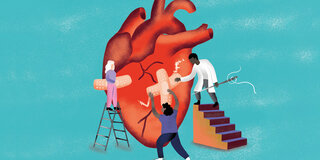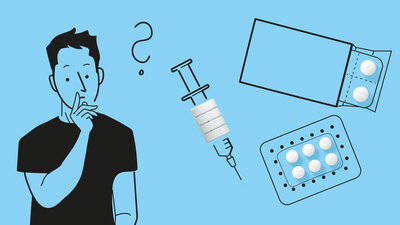Listen To Your Heart! How Our Emotions Impact Upon A Healthy Heart

The heart has a great effect on the psyche - and vice versa.
© W&B/Inga Israel
‘Heinrich, the wheel must be breaking’, the prince cried. Just freed from his pitiful existence as an amphibian, he feared the next danger. The prince had heard a sound at the back of the carriage that was supposed to get him back to his kingdom. However, Heinrich, his faithful servant, replied: ‘The wheel does not break, / 'Tis the band round my heart / That, to lessen its ache, / When I grieved for your sake, / I bound round my heart.’ Heinrich had been so sad after his master had been turned into a frog that he secured his heart with bands of iron to prevent it from flying into pieces. But now, filled with joy for his master’s return, Heinrich’s heart was freeing itself from those bands.
Over 200 years ago, the Brothers Grimm told that story in the well-known German fairy-tale The Frog Prince, or Iron Heinrich. Nowadays, when we talk about the heart, we mostly do so in terms of numbers and data. About 100,000 times a day, its muscle contracts. By the age of 80, it has beaten three billion times and pumped 200,000 cubic metres of blood through the body – enough to fill 80 Olympic-size swimming pools. So, that’s all? Our hearts are nothing but a high-performance pump made from flesh and blood?
The heart: a very important organ
It is not only fairy-tales keeping the age-old persuasion of deeper meanings alive. It’s our language, too. With a heavy heart, broken-hearted, to be close to one’s heart, a heart of flint – emotions, perceptions, even our deeper self all seem to be intrinsically linked to the organ in our chest.
‘The idea that our heart is merely a mechanical pump is relatively new’, says Professor Volker Köllner. He is a specialist for psychosomatic medicine and runs the rehab centre ‘Seehof’ near Berlin. One of the specialisations at the centre: psychocardiology. This relatively new medical specialisation looks at the connections between heart and psyche. For a long time, the modern medical profession had neglected that connection.
In ancient times, however, the connection was very present. In one of the oldest medical texts, the Egyptian Ebers Papyrus written in the 16th century BC, emotions were attributed a great influence upon the well-being of the heart. ‘If his heart is cheerless and has tasted cheerlessness, his heart is constrained’, the text says. Wrath would even eat up the heart. Köllner opines: ‘The notion of a close connection between heart and soul plainly imposes itself.’ After all, everybody can feel the reciprocal impact first-hand: The heart jumps for joy or beats in your mouth for fear.
Science has disenchanted the heart. The cool scientific gaze turned the body into a machine, the heart into its motor. It could wear out or break. But it could also be repaired.
The heart’s physiological function
Today, we know the biological base for this connection: The brain send orders into our chest via hormones, but also directly along the heart-brain axis linking heart and brain via our parasympathetic and sympathetic nervous system. The heart reacts – so rapidly that it used to be difficult for us to make the distinction between cause and effect. ‘We used to think that fear was literally situated in the heart’, says Köllner.
The physiological function of the heart, however, remained undiscovered for a long time. In 1628, the English doctor William Harvey recognised the fact that blood circulates through our body, and that the heart acts as pump. Up until then, medical science had followed the ancient Greek physician, surgeon and philosopher Galen of Pergamon: He had decreed that a sort of fire burned within the heart giving life to the body.
With an increasingly sharper scientific gaze upon the body, the heart lost its ancient magic step by step. The body became a machine, the heart its motor. It could wear out, stutter or break. But it could also be repaired. This kind of view enabled many progressions in the treatment of heart diseases. Today, surgeons perform heart surgery supported by a heart-lung apparatus. With catheters – pliable plastic tubes – they reach the organ without opening up the thoracic cage and re-open blocked vessels with stent grafts. The data prove the success: ‘Twenty years ago, the risk to die from a heart-attack was twice as high as today’, says Köllner.
Nevertheless, there are still cases doctors find hard to explain. Patients in their best years, slim, non-smokers, no history of heart diseases in the family, no other risks – and they still suffer a heart-attack. ‘There was simply no explanation’, says Köllner. Until some ground-breaking new research identified totally different risk factors. For a long time, only one psychological factor behind heart trouble was known: stress.
The effects of stress on the heart
In the mid-1990s, Canadian psychologist Nancy Frasure-Smith examined people after a heart-attack who also suffered from depression. Her surprise findings, according to Köllner: ‘Their risk to die from a heart disease in the following year was six times as high as for people without depression.’ Later on, studies proved that depression is also a risk factor in developing a heart disease – almost as vital a factor as smoking. Subsequently, studies were conducted on people with traumatic experiences, especially in childhood. And also identified strong coherences.
These findings were soon accepted by the medical profession, leading to new therapeutical approaches. One of the German pioneers in psychocardiology was Professor Christoph Herrmann-Lingen. As a young doctor, he was interested in the coherences between heart and psyche. ‘To my boss, I was an eccentric back then’, he remembers. Nevertheless, his superior supported Herrmann-Lingen’s approach to look at the heart in a greater context. About twenty years ago, things changed. In 2003, Herrmann-Lingen was awarded a chair in psychocardiology at the University of Göttingen – the first such professorship in Germany. Six years later, he opened up the very first psychocardiological unit at a German university hospital, employing experts from the fields of cardiology, psychosomatics and psychotherapy.
A lot has changed since then. Many hospitals and rehab clinics now routinely offer therapy based on the connections between heart and psyche. Medical guidelines prescribing the optimal treatment of various heart diseases also explicitly demand a strong focus on the mental and social situation of the patient. But are these guidelines always adhered to? There is no independent validation so far. ‘But the medical care has improved significantly’, says Herrmann-Lingen. On his initiative, hundreds of cardiologists have been trained in primary psychocardiological care. Also professional staff from the fields of psychosomatics and psychotherapy. Cardiology has become holistic once again. Like in ancient times, when the experts still believed in the fire of life burning in our chest.
When The Psyche Weakens The Heart
The news of her husband’s sudden death pierced Edith K. to the heart. She gasped for air, a stab of pain shot through her chest. A heart-attack? Her daughter immediately got the 65-year-old into the car and drove her to the nearest hospital. An electrocardiogram and Edith K.’s blood levels seemed to confirm the suspicion. An examination with a cardiac catheter was surprising, however: no blocked-up vessels, not even any dangerous constrictions. The ultrasound examination also showed unusual results: The left chamber of the heart seemed to be inflated. Pumped only a very limited amount of blood. The doctors concluded: Grief had overpowered her heart. Experts now call it broken-heart syndrome.
The syndrome is but one example of the close connection between psyche and heart health – probably the most impressive one. Case reports like Edith K.’s one are rare. But there are some. The trigger is an exceptional emotional situation: the death of a loved one, an accident, sometimes even exceptional joy. It mostly concerns post-menopausal women. Why that is the case, we don’t know yet. What is certain, however: Stress hormones play a significant role. They flood the body in case of extreme emotions.
Psyche influences the heart
But even if the impact of our psyche is not always as obvious as in the case of broken-heart syndrome: The psyche seems to play an important role in other heart diseases, too, and should always be included in the treatment. ‘It is not about a little bit of extra well-being. It is uncompromisingly about survival’, says Professor Christine Waller, head of psychosomatics and psychotherapeutic medicine at Nuremberg North Hospital. When the psychocardiologist studied medicine, the medical discipline believed to know all cardio-vascular risk factors: hypertension, a high blood sugar level and cholesterol value, disposition – and, of course, life-style. Today, we know that an important factor was missing: ‘Mental and social factors make up about a third of the risk’, Waller claims.
Besides depression, it is mostly interpersonal stress that could be harming our heart. ‘There, we humans are at our most vulnerable’, she continues. Mental injuries due to abuse, battering or neglect are buried deep within our soul and disable us to deal with burdensome situations appropriately later in life.
If the soul is unwell, it is bad for the heart. Especially depression and early traumatic experiences increase the risk of heart diseases.
With anxiety disorders, the connection seems to be less tight. As the heart races in case of panic, we often immediately think of a heart seizure. Luckily, that fear is mostly unfounded: A racing heart is a consequence of panic – and not the other way round. It is therefore not dangerous to confront one’s fears and anxieties while in therapy. Rehab expert Volker Köllner is glad to be able to reassure his patients: ‘We can say with an easy conscience: Return to life! It’s the best you can do for your heart.’
Mechanisms that connect the psyche with the heart
But why does our psyche impact so directly upon our heart? Christine Waller researches the mechanisms behind the impact. We now know that traumatic experiences can readjust the so-called stress axes permanently. Theses axes regulate the release of stress hormones. The readjustment has an impact upon a number of messengers, including cortisol. Not just the risk of hypertension increases – the immune system also gets inhibited. Our blood coagulates more easily, increasing the risk of infarcts. Furthermore, there is a light but permanent inflammation in our body that also plays a role in depression. The inflammation is known to cause dangerous deposits in our vessels. According to Waller, more research is needed into the impact of stress – to enable doctors to regulate with medication eventually.
Our mental well-being also has an indirect impact upon the heart – via our behaviour. If you feel down or suffer from limited self-esteem, you might find it more difficult to look after your health. Why bother, if all is meaningless anyway? Köllner remembers a patient who had just undergone a heart transplantation. Nevertheless, she continued to smoke. Doctors and nursing staff were livid. How could she, after receiving such a live-saving present?
In therapeutic talks with Köllner, however, she unveiled her difficult personal history. As a child, she had been neglected by her alcohol-addicted parents. She also experienced sexual abuse. In her marriage, she also suffered from violence. Of course, she now also expected grief from her therapist. But Köllner said: ‘I see that you have never learned to look after yourself. And how could you?’ The patient was really moved, and started with psychotherapy. She learned to accept and to be considerate to herself – and she ultimately stopped smoking.
A psychotherapy, however, is not for everyone. At Nuremberg North Hospital, the experts are looking at various alternatives to ease mentally-scarred patients into treatment. Initially, they try to find out if the psyche plays an important role in the disease. If that is the case, the patients stay on the same ward after heart surgery – and get looked after by a mobile therapy team. The patients learn to develop a positive attitude towards their heart. They get instructed in relaxation and awareness techniques. But they also talk about their personal history. Why did I smoke? Why was my diet so unhealthy? And: What do I have to do to change things? If you find the right answers to these questions, you have made a decisive step towards a healthy heart – and a healthy life.
When The Heart Weakens The Psyche
Dr Denise Lenski remembers the patient well, although it was in 2012: ‘He told me that he was lying around the compound of the University Hospital Homburg on his own for some time – totally helpless.’ Due to severe cardiac arrhythmias he had suffered a series of shocks from his implanted defibrillator. The device, implanted into the body like a pace-maker, can safe the lives of patients with severe heart diseases. The electric shocks necessary, however, can be a traumatic experience. Psychologist Lenski helped him to digest the burdensome experience back then. ‘The man recovered well’, she recalls.
The psychotherapist looks back fondly upon her time at the Saarland University Hospital in Homburg: ‘ I have experienced what kind of things the patients suffer – and was always surprised how much I could achieve with often simple measures.’ She began to specialise in psychocardiology. Since 2013, she has been running her own psychotherapy office in Saarbrücken. Her patients suffer from anxiety disorders, depression and other mental maladies. About 60 per cent of them suffer from a heart condition.
Many heart patients need psychological help
The demand is high for such therapies. Many patients with a heart condition also need psychological support, as research data indicate. Every fifth patient with narrowing coronary vessels, for example, develops a severe depression. Partially in consequence of the heart condition, partially independent of the condition. In both cases, however, it is true that treating the depression also has a positive impact upon the heart. If not, the risk of an early death increases. The same is true for post-traumatic stress disorder (PTSD): Every eighth heart-attack patient develops PTSD. If the heart-attack remains undigested, the patient relives his or her stress and fears during the attack again and again. Many suffer from severe sleep disorder.
‘A heart-attack, a cardiac arrest or heart surgery threaten a human being in his very existence. Many feel disappointed in their blood-pumping organon and forsaken by it’, Dr Katharina Tigges-Limmer reports. The psychological psychotherapist and psychocardiologist knows her patients’ distress only too well: For 13 years now, she has been in charge of the medical-psychological unit of the Clinic for Thoracic and Cardiovascular Surgery at the Heart and Diabetes Centre in Bad Oeynhausen.
Her team looks after patients before and after heart surgery – including those waiting for a heart transplant. ‘The waiting phase is a psychologically exceptional situation’, Tigges-Limmer says. The patients hope for a new lease of life, but are also scared of death at the same time. Their situation is deteriorating, and they fear to die before a donor organ is given to them. ‘Some also develop feelings of guilt, as their hoped-for happiness is based on the death of another human being’, she adds.
Studies confirm: Heart surgery is more successful if the patient is looked after psychologically. Over ten years ago, Tigges-Limmer was able to prove that fact for patients with narrowing coronary vessels who had received a bypass. They were given the option of psychological support. Tigges-Limmer recalls: ‘The people were more optimistic and more relaxed than the reference group.’ They were also faster out of bed and showed more endurance.
Even before bypass surgery, it is helpful to boost positive expectations – according to research conducted at Marburg University. The patients had less stress hormones in their blood and were able to leave hospital earlier than other patients. Six months after surgery, they were in much better shape than patients who had not received psychological support: They had a better grip on their disease, felt more efficient and suffered from anxiety and depression to a lesser extent.
The importance of psychotherapy
Psychotherapists use quite a number of methods to achieve that result. There is psychoeducation, for instance. The patients receive information on the nature of their disease, on the risks and benefits of surgery. They also learn to control their stress and fear – with the help of relaxation techniques like autogenous training and progressive muscle relaxation (PMR), for example. Another method often used is the so-called cognitive behavioural therapy. It aims to give a positive spin to your thoughts and feelings with regards to the disease, the treatment and the hospital.
Tigges-Limmer’s team in Bad Oeynhausen also favours medical hypnosis. The psychocardiologist recently supported a severely inflicted patient who found it very difficult to recover after his third heart surgery, as to be expected. He felt under pressure from his environment to recover more quickly. ‘I sent him into a trance and asked him to build a semi-transparent protective dome around himself.’ The dome was in his favourite colour, scarab blue, and only allowed helpful and encouraging information to penetrate the inside. All the burdensome and pushy stuff, however, was repelled. ‘The patient relaxed and smiled. And he told me he was well then.’ Studies indicate that medical hypnosis can help to reduce anxiety, stress and pain during surgery.
But there is a problem: ‘Psychological support in heart surgery and cardiological units is by no means the rule’, says Christoph Herrmann-Lingen. Now in charge of the Department of Psychosomatic Medicine and Psychotherapy at the University Medical Centre Göttingen, he has been working on the relationship between heart and psyche for over 30 years. He suggests a fixed staffing ratio for psychological and psychotherapeutic professionals at every heart clinic, following the example of cancer and tumour centres. It is standard by now for cancer patients to receive psychological support at such centres.
No standards concerning heart patients
As long as such care is not standard for heart patients, however, they need to take the initiative themselves. If you feel down for weeks, lack stimulus, suffer from fatigue and sleeplessness, you should definitely contact your general practitioner. Also in case of anxieties – if you, for example, avoid certain situations for fear of a further heart seizure. If needs be, your general practitioner will commit you to a psychotherapist’s praxis. The appointment service of the Association of Statutory Health Insurance Physicians will also procure an appointment by phone (phone 116 117). Furthermore, you can contact your health insurer to find out about therapies funded by the insurer, autogenous training for example. Exercise groups for heart patients can also be of help: Exercising together strengthens your body – and your psyche. Your general practitioner can refer you to one such group.
Nowadays, there are more and more specialised professionals looking after heart patients. Denise Lenski is one of them. ‘I take a close look at the reports, and consult with the doctors when appropriate’, she explains. That gives her a good idea on how resilient a patient really is. Especially in case of depression, it is very important to ascertain whether the heart condition or the mental problems are responsible for the recurring fatigue. That helps Lenski to identify the treatment methods necessary.
To look at heart and psyche simultaneously: This holistic approach has defined Christoph Herrmann-Lingen’s professional career. Now he wants to prove that patients with a cardiac insufficiency benefit from that approach. He coordinates a European-wide study called ESCAPE, trying out a new type of care. One group of participants get regular calls from specially-trained professionals in addition to the care received by their general practitioners. These experts address all questions the patient might have, gather data on physical and mental ailments and give advice. A team of experts also provides online support via video link.
The ESCAPE study will run until 2025. Herrmann-Lingen hopes to prove the approach’s effectiveness and persuade health insurers to pay for the treatment in future: ‘Basically, every doctor would then be able to provide such care.’






